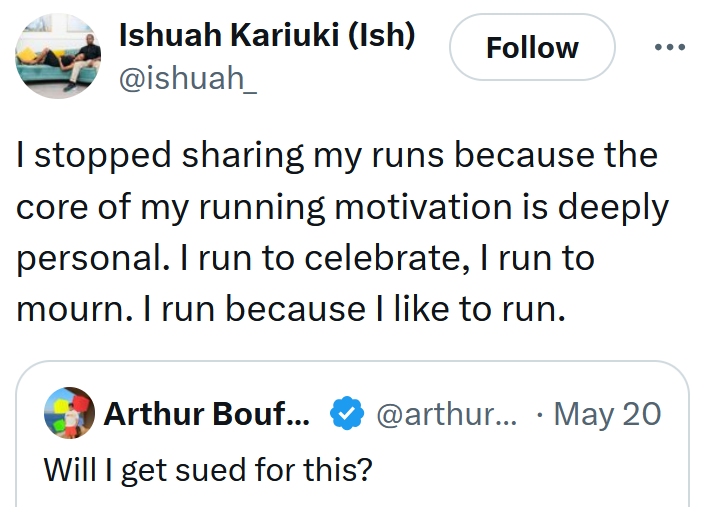A developer is challenging a shift in runner culture with a new app that generates a fake summary of your route and stats. Fake My Run imitates Strava—a popular app that tracks exercise habits and progress—but lets you pick your own pace, time, distance, and so on without the trouble of actually running at all. It’s a little like paying someone to run for you, which apparently is a real thing that happens.
Arthur Bouffard says he did this to confront a cultural focus shift away from health and discovery and toward status and social media views. But also, he thought it would be amusing. Based on the comments, people certainly seem entertained.
You can fake your run without Strava mules
Bouffard announced the launch of Fake My Run on Tuesday, explaining how it works in an X post. Access the website, choose or draw a route on the map, then select your pace, date, and start time. You can toggle between running and biking, add a description and name it, then click to download the fake summary.
Unlike Strava, which lets users access its basic features for free, each download will cost you. U.S. users must pay $3.50 for each “token” required to download the file. According to Bouffard, of the site’s 50,000 visitors, hundreds have already purchased tokens.
The developer writes that his inspiration for the app came from the rise of “Strava mules.” Some runners and other athletes are so invested in their image that they’re juking their stats by hiring people to run for them. This phenomenon made Bouffard think, “There has to be an easier way.”
Speaking with the Daily Dot, he suggested the emergence of these “Strava mules” indicated a warning sign for running culture
“The Strava Mule phenomenon seems like a distress call,” he said. “A realisation for many that running has become too performative and ego-filled. I’m not actually certain if a lot of people ended up using Strava mules, but it did show that there is a problem with how these apps create social pressure.”
Launching from the Strava mule incident, Bouffard further expressed concern over changing runner attitudes fueled by influencer culture and social media generally.
“Running used to be a very personal sport that was mainly practised to challenge yourself, to improve your physical and mental health, to stay in shape, to compete with others, to discover new parts of the world, etc,” he wrote.
In an email, he pointed to the increasing social media-fication of everything, including fitness apps, as a source of the shift away from healthier running motivators.
“With running clubs, KOMs, likes/kudos, shareable stories of activities, rankings and titles, group/dating pool runs, etc,” he wrote. “There’s nothing inherently wrong with competition and some of these things, but the social aspect seems to be very double-edged.”
“It can act as a motivator, but also as a way to easily feel disappointed, dissatisfied with yourself, and excluded. Just like social media and the way it can make you feel (the good and bad).”
Since people are starting to fake their runs anyway, Bouffard figured he’d help push people to doubt the workout summaries they see on their feeds. After all, if you can’t trust the posted stats, why pay attention? And if people aren’t paying attention, then why post? Why not just run for the health benefits, the mood boost, and the friends you make along the way?

As X user @peduarte put it, “Believe nothing. Not even people’s runs.”
Bouffard added that he did it because “it was technically doable and entertaining.”
Reactions: Love it, challenge it, or exploit it
Aside from those shocked about “Strava mules” being a thing, people seem to love the idea of Fake My Run. There are some detractors, but most of them seem to have missed the point of Bouffard’s post. Those who get it are enjoying the attack on influencer culture, and some think it could also be a great route planner.

“I love each mile of it,” said @acabelt.
“This will get you a lot of money if you focus on GymRats users,” @baldatitiris pointed out.

A few commenters detected flaws in Bouffard’s plan, and others think they could find a way to detect the fakes.

“Haha cool product! But the pace would give anyone away. Should add a ‘realism’ filter to that,” suggested @CryptoSpaces1. “‘Sorry, no one will believe you’re not running faster than Kiptum.’”
“I’m a backend for RunKeeper, I do wonder how easily I can write something to detect these,” wrote @Ryanc268, “challenge accepted I suppose!”

‘I run because I like to run’
Whether or not they liked the idea of Fake My Run, other commenters shared Bouffard’s sentiments on today’s running culture.
“I stopped sharing my runs because the core of my running motivation is deeply personal,” said @ishuah_. “I run to celebrate, I run to mourn. I run because I like to run.”

Bouffard told us he found the reactions to the app launch fascinating and that they varied based on how much context he provided. Just announcing the app without explanation didn’t go over well on TikTok.
“On my first TikTok post, I didn’t really explain why I made Fake My Run, and people were very upset. Got a lot of interesting messages,” he said. “But since launching on Twitter/X and LinkedIn with a more in-depth explanation, reception has been overwhelmingly positive. Especially from other members of the running/cycling community who completely agreed that things have been going too far.”
The internet is chaotic—but we’ll break it down for you in one daily email. Sign up for the Daily Dot’s web_crawlr newsletter here to get the best (and worst) of the internet straight into your inbox.


